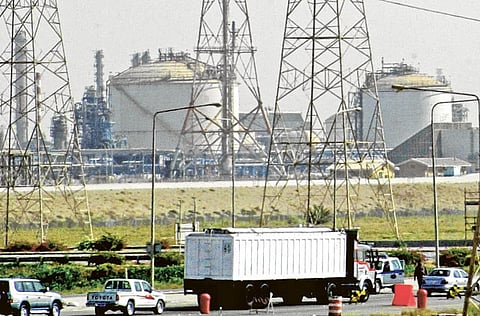Energy security tied to Arab stability
The move to democracy in its wider meaning and the respect of human rights are absolute requisites for the region to move forward

The June editorial of the Bulletin of the Organization of Arab Petroleum Exporting Countries (Oapec) states that "for the last 50 years the Arab region has occupied a prominent position in regard to world fossil energy resources owing to its countries' vast reserves of oil and natural gas."
As we all know, the Arab world is engulfed in turmoil in a number of countries and it is important to look where it stands with respect to its "prominent position" that's expected to continue well into the future. At the end of 2009, crude oil reserves were almost 684 billion barrels or 58 per cent of world reserves. Although reserves growth has slowed down, Arab reserves are growing faster than any other region. I know that reserves accounting is changing around the world where some heavy deposits are now added to conventional reserves, but the fact remains that Arab oil reserves are still bountiful and the easier and less costly to produce. Similarly, natural gas reserves were almost 55 trillion cubic metres or 29 per cent of world reserves.
The production of crude oil was 21.3 million barrels a day (mbd) and when natural gas liquids are added, the volume comes closely to 24.8mbd or 29 per cent of world oil demand.
This share is very much less than what is commensurate with reserves which make the Arab countries the "central bank" for world oil demand.
Exports of crude, products and natural gas liquids are close to 19 mbd or 22 per cent of world demand, a very substantive part indeed.
Marketed natural gas is 433 billion cubic metres (bcm) or almost 15 per cent of the world. While most of the marketed gas is consumed domestically, the exports are a substantive 168bcm, 65 by pipeline and 103 in the form of liquefied gas.
Again, production and utilisation of natural gas is less than the potential due to flaring and the late development of the gas industry with respect to oil.
Fuel of choice
But this is going to change. Gas is now the fuel of choice whether locally or for export and there is good prospect for additional pipelines and development of free gas fields.
The refining capacity in the Arab world is close to 7.8mbd and in the last decade or so it has become more complex in order to meet international standards of petroleum products not only to protect local environment, but to be able to preserve its opportunity in the export markets. In some countries, such as Saudi Arabia, the integration of refining with the petrochemical sector is well advanced and so is the participation with international companies. The refining capacity may be expanded to reach 10mbd in the decade to come. Even in transportation, the Arab effort may be less than desired but still quite important. There are 96 tankers for crude and products, 45 LNG carriers and 21 LPG carriers. It is quite possible that expansion here will go in parallel with increased production of oil and gas.
Having this picture in mind, it is clear that the future role of the Arab industry will become increasingly important in energy supply, a fact that is well understood by governments of the Arab producing and exporting countries and is usually reflected by their investment programmes to meet their objectives and those of their clients.
"The Arab Petroleum Investments Corporation forecasts an increase in the number of new energy projects in the Arab states and estimates these will need capital of about $430 billion (Dh1.5 trillion) between 2011 and 2015."
The Bulletin goes on to say "some Arab oil and natural gas producers are currently experiencing a high level of political tension. As a result their production has dropped and some petroleum installations have stopped operating altogether for various reasons" raising concern about security of supplies.
Of course, the current affairs should raise concern but the world, or those who are powerful enough are not doing the right things to generate stability and enhance energy security.
How long shall the Arabs wait for the Palestinian people to be free? Has the invasion and occupation of Iraq contributed to energy security when its production is less and violence and destruction are recurring? How long and how much will be needed to repair and bring back the Libyan oil industry?
The worsening situation in Yemen and Syria, and God knows who is next, will be detrimental to energy security. The move to democracy in its wider meaning and the respect of human rights are absolute requisites for the region to move forward. At the same time, the region needs more understanding and a serious look at its problems.
The author is the former head of Energy Studies Department in Opec Secretariat in Vienna.
Sign up for the Daily Briefing
Get the latest news and updates straight to your inbox

